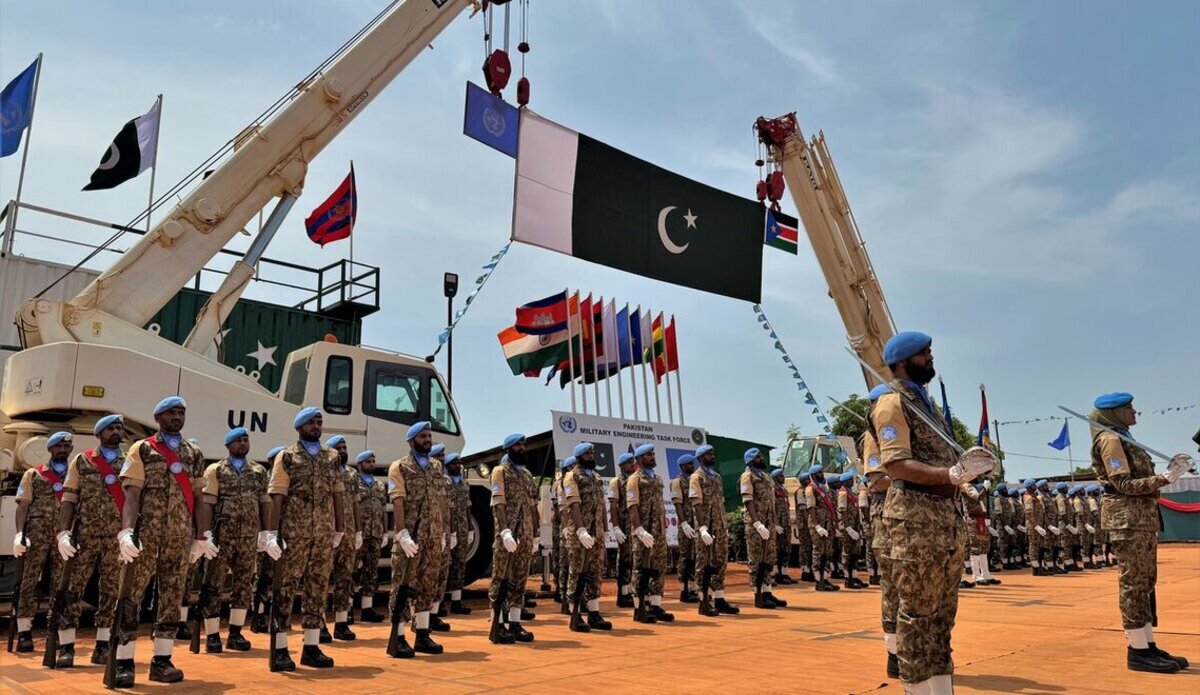
The humanitarian efforts of Pakistan’s peacekeeping contingent in South Sudan have recently received notable appreciation from an unexpected source. In an encouraging gesture amidst tense Indo-Pak relations, Indian Force Commander Lt. Gen. S. Mohan of the UN Mission in South Sudan commended the efforts of Pakistan’s peacekeeping contingent in rescuing and providing relief to flood-affected communities. This appreciation not only highlights the professionalism of the Pakistani military but also represents a significant example of how common humanitarian goals can transcend geopolitical divides.
The commendation came in the form of a letter to Pakistan’s Chief of Army Staff, General Asim Munir, where Lt. Gen. Mohan acknowledged the professionalism and unwavering commitment of the Pakistani contingent in providing life-saving support to the people of South Sudan, particularly in the wake of devastating floods that have ravaged communities, destroyed villages, and left thousands stranded. Amidst the tensions that have often characterized Indo-Pak relations, this recognition brings attention to the critical humanitarian role that Pakistan’s military personnel play in UN peacekeeping missions globally.
UN Peacekeeping and Pakistan’s Role
The UN peacekeeping mission in South Sudan faces substantial challenges, with the region grappling with political instability, internal conflicts, and environmental crises. Pakistani peacekeepers, known for their consistent contributions to UN missions, have upheld their reputation as reliable and capable partners. Since the UN’s establishment, Pakistan has been one of the largest contributors to peacekeeping forces, sending thousands of personnel worldwide to support peace and stability in conflict-ridden regions. In South Sudan, Pakistan’s contingent has played a pivotal role in not only maintaining peace but also in executing complex humanitarian operations, often at personal risk to the soldiers involved.
Flooding in South Sudan this year reached crisis levels when torrential rains overwhelmed the Arbaat Dam, leading to the destruction of nearly two dozen villages and resulting in a significant number of deaths. In these dire conditions, Pakistani peacekeepers, including officers Brigadier Shafqat Iqbal and Lieutenant Colonel Shahbaz Aslam, were at the forefront of rescue efforts. Their team undertook challenging engineering tasks, such as constructing temporary shelters, securing flood-affected areas, and protecting civilians. Their dedication safeguarded over 250,000 internally displaced persons (IDPs) who would otherwise have been left vulnerable in hazardous conditions.
The Importance of Humanitarian Missions
This recognition of Pakistani peacekeepers by an Indian official shifts the narrative from military tensions to one of mutual respect for humanitarian commitment. Both nations may often find themselves at odds, especially over the Kashmir dispute; however, this commendation reminds the world that humanitarian values can transcend borders and rivalries. Despite political differences, the acknowledgment reflects Pakistan’s efforts to be a responsible global citizen and to support those in need, irrespective of nationality or geography.
For the Pakistani military, this recognition boosts morale and strengthens the international image of Pakistan as a peace-oriented country, committed to helping vulnerable populations worldwide. Pakistan’s Foreign Ministry highlighted the significance of this event as a demonstration of Pakistan’s dedication to fostering peace, not just regionally but globally. This acknowledgment by an Indian military officer also helps dismantle stereotypes about Pakistan’s intentions, showing the Pakistani military’s operational expertise and humanitarian focus.
Looking Forward: The Diplomatic Impact
This event underscores the potential of humanitarian collaboration as a catalyst for improving diplomatic relations. High-ranking officials from Pakistan and India have long stressed the importance of pursuing non-military avenues for engagement, such as trade and cultural exchange. The recent appreciation could mark a foundation for the two nations to explore more constructive engagements in areas of mutual interest, such as climate action, disaster management, and health security. By concentrating on shared concerns, such as natural disaster preparedness, counter-terrorism, and civilian protection, both Pakistan and India can find common ground to foster trust. In a world where complex crises increasingly demand cross-border collaboration, this commendation shines a light on the potential for India and Pakistan to explore partnership opportunities, even if limited to non-military domains.
In conclusion, the Indian general’s praise for Pakistani peacekeepers in South Sudan is more than just an acknowledgment of exceptional service. It serves as a bridge, illustrating that even amidst longstanding conflicts, humanity can prevail. It reinforces Pakistan’s role as a compassionate and peace-driven nation and symbolizes the hope for a more collaborative future, where shared responsibilities can bring traditional adversaries together.
